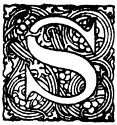THE PRIEST AND THE ACOLYTE[1]
THE
PRIEST
AND
THE
ACOLYTE [3]
WITH AN
INTRODUCTORY
PROTEST BY
STUART MASON
LONDON: AT THE LOTUS PRESS
NINETEEN HUNDRED AND SEVEN
Introductory Protest

SO[5]many copiesof “The Priestand the Acolyte”havebeen sold byunscrupulous publishers andbooksellers under the implicationthat it is the work ofOscar Wilde that it has beenthought good to issue thisedition with the object of puttingan end, once and for all,to the possibility of purchasersbeing misled as to the authorship.
The story was originally publishedin The Chameleon, the[6] first and only number of whichappeared in December, 1894.The author of the story was anundergraduate at Oxford, “aninsufficiently birched schoolboy,”as he has recently beendescribed, and he alone wasresponsible for the contents ofthe magazine which he edited.At the time of the trial of LordQueensberry for libel a fewmonths later it was attempted toshow that Oscar Wilde not onlyapproved of the theme of thestory, but that he was actuallya party to the publication of it,on the grounds that he sent tothe editor a number of aphorismsunder the title of “Phrases andPhilosophies for the Use of theYoung.”
The simplest way of showing[7] what Oscar Wilde really thoughtof the story is to quote what hesaid when examined in Court onthe subject.
John Sholto Douglas, EighthMarquis of Queensberry, wasarrested on a warrant on March 1, 1895, on a charge of utteringa criminal libel against OscarWilde. On the following morninghe was brought up beforeMr. Newton at MarlboroughStreet Police Court, and aftersome formal evidence had beentaken was remanded on bail fora week, and on the second hearingwas formally committed totake his trial at the CentralCriminal Court a few weekslater.
The trial began at the OldBailey on Wednesday, April 3,[8] before Mr. Justice HennCollins. Sir Edward Clarke,Q.C., M.P., Mr. Charles Mathewsand Mr. Travers Humphreysappeared for the prosecution;Mr. Carson, Q.C., M.P.,Mr. C. F. Gill and Mr. A. Gillbeing for the defence.
The court was crowded. TheMarquis was the first to arrive.He came in alone, and stood, hatin hand, in front of the dock.
![[Cover: The Priest and the Acolyte — with an Introductory Protest]](https://oldbook.b-cdn.net/kitaplar/7/pg60229-h/images/cover.jpg)